So a number of students, media members, and colleagues have been asking this afternoon what I think of NBA Commissioner Adam Silver’s lifetime ban of Clipper’s owner Donald Sterling following the release of racist comments apparently directed at his mixed-race mistress. (Silver says the league will also fine Sterling $2.5 million and do “everything in his power” to force Sterling to sell the franchise.) I guess I’m glad that the league came down hard and did so quickly. Sterling’s most recent comments are obviously just the tip of the iceberg—his whole history of racist attitudes and behaviors, and the fact that he had the wealth and power to actually act upon these views reminds of the familiar definition of racism: prejudice + power. I still have no idea how this guy was set to receive a Lifetime Achievement award (was it his second?) from the NAACP in LA.
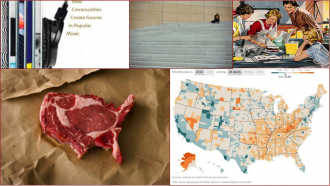 Pretense: Dropped.
Pretense: Dropped.
That’s right, we’re just going with it. I sometimes don’t have time to do the Roundup on Fridays, but I know you, the adoring TSP public, need to know! Hence, most likely the Friday Roundup will continue on Mondays for a bit, but hey, sometimes I’ll mix it up. Isn’t that what good Internetz users do? Wait. I’ve gotta go check with the hip kids…
Here’s what’s happened on TSP in the last week!
Brilliance: Also Dropped.
Features:
“Music and the Quest for a Tribe, with Jenn Lena,” by Sarah Lageson. From rockabilly kids to dubsteppers and punks, finding our musical tribe can be a key part of creating identity. more...
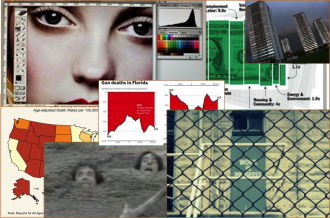 Sometimes, it turns out to be Monday.
Sometimes, it turns out to be Monday.
But there’s still great stuff to read from last week!
Office Hours:
“Matt Wray on the ‘Suicide Belt’,” with Scott DeMuth. A podcast on the wide swath of the Western U.S. where suicides cluster.
There’s Research on That:
“On Heartbleed and Hackers,” by Evan Stewart. What sociologists know about the subcultures and criminal habitus of the hacker.
Citings & Sightings:
“Young Girls Consider Sexual Violence Normal,” by Kat Albrecht. #EverydaySexism in full effect. more...
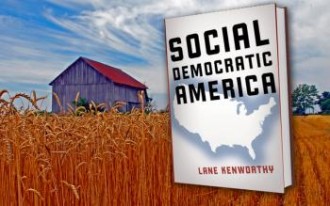
Procrastination? No way. When it comes to economics, it’s just that I’ve spent my past few weeks thinking about the topic in sociological rather than personal terms.
It started back around spring break, when a group of political scientists proposed a reading group on Thomas Piketty’s Capital in the Twenty-First Century. The book is a little windy and Piketty may be an economist, but he thinks like a sociologist—not only in taking on the problem of inequality itself but in seeing it as a problem, in understanding its roots in social and political systems, and in using graphs and charts to bring complicated and troubling economic trends to life.
It continued a week or two later when Richard L. Zweigenhaft and G. William Domhoff sent us a synopsis of the new edition of their book on corporate diversity (or the lack thereof) in the contemporary United States. I love this long-term, fairly basic project because so often when we sociologists study social inequality we focus on disadvantage, marginalization and poverty. Zweigenhaft and Domhoff—or, as I like to call them, Richie Z. and the Big B.D.—turn this on its head, tracking the social demographics of the other side of the economic coin, the most privileged of Americans, the corporate elite. We published that just last week as “Trends at the Top: The New CEOs Revisited.”
And, after lecturing on the cultural and political foundations of capitalism last week in my Intro class, I’ve spent the last few days reading Lane Kenworthy’s bold, visionary call for better government involvement in our economy and collective lives, Social Democratic America. The timing isn’t accidental, nor all just about taxes. Kenworthy is going to be here on campus at Minnesota tomorrow, as part of our ongoing Scholars Strategy Network series. It should be good.
Okay, now that I’ve got that off my chest, I’ve got a little paperwork to prepare for tomorrow’s mail.
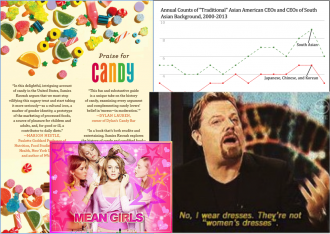 A tag-cloud for this week’s roundup might be astounding and jarring, since it runs the gamut from candy and cohabitation to affirmative action revision, diversity trends among the powerful, community health centers in Texas, and 20 years of remembrance in Rwanda. Herewith: what we’ve been up to this week.
A tag-cloud for this week’s roundup might be astounding and jarring, since it runs the gamut from candy and cohabitation to affirmative action revision, diversity trends among the powerful, community health centers in Texas, and 20 years of remembrance in Rwanda. Herewith: what we’ve been up to this week.
Features:
“Trends at the Top: The New CEOs Revisited,” by Richie Zweigenhaft and Bill Domhoff. A look at who’s sitting in the corner office—or just outside it, nose pressed to the glass—reveals a new trend in diversity.
“How Recent Immigration Complicates Our Racial Justice Policies,” by Asad L. Asad. Should affirmative action be reformed to include newer, but still marginalized, groups within the U.S.?
Office Hours:
“Samira Kawash on Candy,” with Kyle Green. The self-proclaimed @candyprofessor joins us for a look at the rise and fall and rise and fall—oh god, is this a sugar high?—of candy’s rep in American culture. more...
Well, we’re pretty sure you can, too—no dance-offs required. Still, there are some guidelines that will help you in pitching an article idea and getting from proposal to finished product. We work hard to make sure that this is a rewarding, relatively painless process in which your words get the special treatment from our editorial staff and your graphics get spiffed up by our excellent graduate student Suzy McElrath. Here’s how to get started:
- TSP is not a typical journal. Broadly, we want to publish big picture articles that can provide basic data and information missing from public debates, supply context to the news, or add sociological insights to the general public.
- Jargon lover? Strip it out to the extent that you can. Again, we have an enormous and lively audience of readers, and there’s no way all million of them are sociologists. They don’t speak academic-ese, so you’ll have to try to drop it. When it’s useful, use the terminology but add a parenthetical that explains it informally.
- Now, if you’re still feeling excited and want to get a little feedback before diving in to a full-length draft, send us the following:
- Your hook. What’s the intriguing first sentence? What’s the five-word title of true interest? We prefer titles without colons or question marks, so try to go for interest over explanation in your title. Let the paper do that work.
- Your first paragraph; we’d like an idea of what your style is and where you’re going with the piece.
- The overall point. What do you want readers to take away from the piece?
- Your recommended readings. We’d like to see 4-6 recommended readings that will help the lay reader who is interested in learning more about your topic. If it’s not behind a paywall, awesome! Eventually, we would also like a descriptive sentence that explains why each reading is particularly useful or ground-breaking.
Now you’re ready! Get that sociological imagination in gear, because open-access AND the chance to make it into a print volume is just too cool to pass up.
letta@thesocietypages.org
hartm021@umn.edu
uggen001@umn.edu
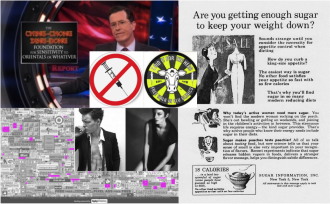 What’s up with what’s up on The Society Pages this week:
What’s up with what’s up on The Society Pages this week:
Features:
“Health, Science, and Shared Disparities with Brian Southwell,” by Sarah Lageson. Social networks may be great for getting the word out, but that’s highly dependent on the network. more...
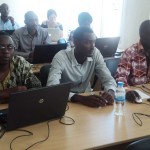
My spring break involved an intense research trip to Rwanda with Hollie Nyseth Brehm, but we reserved the last day for something fun: a methodology workshop for researchers at The National Commission For The Fight Against Genocide. We gave a whirlwind presentation from 9-12, then held office hours to address specific projects. I worried we wouldn’t get much traffic, but the researchers had so many sharp and important questions that they kept us hopping all afternoon.
With so much recent hand-wringing over the relevance and impact of social research, it was inspiring to connect with researchers squarely addressing problems of unquestioned importance — understanding a genocide that took a million lives, investigating and ameliorating its effects on survivors, and working to prevent its recurrence within and outside Rwanda. So I began by asking, “Whose research is more important than yours?” and then stressed the central role of design and methodology in getting it right.
The researchers were super-smart and accomplished but came to us with varying levels of methods training. We therefore emphasized building a strong foundation: posing tight research questions, theory and conceptualization, levels of analysis, data and valid measures, sampling difficult-to-study populations, criteria of causality, research ethics and positionality, publishing and dissemination, and specific issues in interviewing, comparative and historical analysis, and univariate, bivariate, and multivariate statistical analysis. That’s a lot for a semester, let alone a half-day workshop. Throughout, we discussed the importance of humility in doing good research — listening, learning, and keeping an open mind. As is often the case in teaching, we were humbled by the collective expertise and dedication among the researchers. On the subject of “sensitive interview questions,” for example, I turned the microphone over to a participant who had just finished a set of interviews that were an order of magnitude more sensitive than any I’d conducted in my research career.
We can’t say whether or how our little methods session might affect the Center’s research, but Hollie and I certainly gained much from the experience. Yes, we “know stuff” as social scientists, but we have also developed a wonderfully useful set of tools for acquiring this knowledge. And once researchers understand the basic idea of something like multistage cluster sampling, they can often make thoughtful design choices that yield better research with fewer resources. It may seem too obvious to mention, but many of our methods discussions within the field seem devoted to “tweaking and critiquing” more esoteric designs and models. So it is both refreshing and empowering to share some of the methodological foundations of our field with such sharp and motivated researchers.
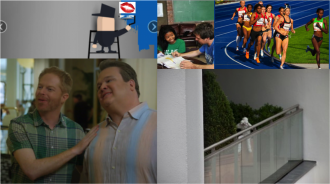 Okay, let’s be real. It’s not Friday. But wouldn’t that be fun? We could annoy ourselves with that Rebecca Black song, merrily chirp “T.G.I.F.!” at passers-by, and dream of our weekend plans… none of which I was doing this past Friday, when I was so mired in work I couldn’t look ahead, let alone behind to sum up the week on TSP. Now’s the time for a little reflection!
Okay, let’s be real. It’s not Friday. But wouldn’t that be fun? We could annoy ourselves with that Rebecca Black song, merrily chirp “T.G.I.F.!” at passers-by, and dream of our weekend plans… none of which I was doing this past Friday, when I was so mired in work I couldn’t look ahead, let alone behind to sum up the week on TSP. Now’s the time for a little reflection!
Features:
“Same-Sex, Different Attitudes,” by Kathleen Hull. A lot’s changed in just a few years—why are American attitudes on same-sex marriage moving so quickly? more...

Spring break brings time for reflection. Last week during my days at home in Minnesota (where it still does not feel like spring), I spent a little time reflecting on what we’ve learned about sociology in doing The Society Pages. And in that process, I came across this line, which can be found in the “About Us” that runs in the banner on our home page: “we’re talking about society with society.”
I haven’t always been enamored with this phrase. In the past, it has read to me as a bit trite, and probably kind of functionalist. Truth be told, I’ve tried to edit it out of existence several times. But somehow—largely, I think, due to the insistence of our masterful associate editor and coordinating producer Letta Page*—it has hung around, and recently, it has begun to grow on me. Part of its emerging appeal is that I have had folks use it to introduce me and TSP at several public events recently. Clearly it works, it has appeal. It means something. Why is that? What is that?
Besides the catchy turn of phrase, I think the reason it resonates is because it stands in contrast to the usual “detached ivory tower intellectual.” It signals a vision of sociology and scholarly activity that is embedded and engaged in the worlds and with the people that it studies—or, even better, engaged and involved in the communities of which it is part and parcel.
One of the readings that has been a staple of the senior capstone sociology course I teach regularly has been a piece from Minnesota public affairs scholar Harry Boyte. The basic gist is that social scientists should not think of themselves as legislators (who come from on-high, bearing truth to the people), but as interpreters, whose job it is to produce information and ideas that can enrich public discussion and policy. Even better, they should be part of those processes of deliberation and public policy formation. In other words, social studies scholars should understand ourselves as part of the public, working with everyone else to refine our understandings of the worlds we all share and live in together.
This more involved, reflective orientation isn’t just about producing a more accessible and useful sociology for society (which we talk about a lot here at TSP), but actually—in its engagement with real people in the social world—a better sociological understanding of society itself. In short, it’s about creating a better sociology.
*I knew he’d come around. –Ed.
